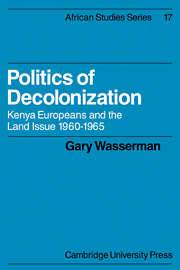Book contents
- Frontmatter
- Contents
- Dedication
- Acknowledgments
- Map
- Introduction: Kenya as a case study
- 1 Consensual decolonization: conditions, process, and the salient aspects of the Kenyan case
- 2 Background to decolonization: trends and groups in the European community
- 3 1960, initiating the bargain: the lobbying on the land issue and the dividing of the European community
- 4 1961, negotiating the bargain: accelerating the bargaining, deepening the divisions
- 5 1962, making the bargain: the resolution of the land issue and the dissolution of the European groups
- 6 1960–1970, sealing the bargain: the implementation of the Kenya land transfer schemes
- 7 Conclusion: Europeans, land and decolonization
- Notes
- Selected bibliography
- Index
1 - Consensual decolonization: conditions, process, and the salient aspects of the Kenyan case
Published online by Cambridge University Press: 04 August 2010
- Frontmatter
- Contents
- Dedication
- Acknowledgments
- Map
- Introduction: Kenya as a case study
- 1 Consensual decolonization: conditions, process, and the salient aspects of the Kenyan case
- 2 Background to decolonization: trends and groups in the European community
- 3 1960, initiating the bargain: the lobbying on the land issue and the dividing of the European community
- 4 1961, negotiating the bargain: accelerating the bargaining, deepening the divisions
- 5 1962, making the bargain: the resolution of the land issue and the dissolution of the European groups
- 6 1960–1970, sealing the bargain: the implementation of the Kenya land transfer schemes
- 7 Conclusion: Europeans, land and decolonization
- Notes
- Selected bibliography
- Index
Summary
Their purpose is to capture the vanguard, to turn the movement of liberation towards the right and to disarm the people: quick, quick, let's decolonize. Decolonize the Congo, before it turns into another Algeria. Vote the constitutional framework for all Africa, create the Communaute, renovate that same Communaute, but for God's sake let's decolonize quick.’
Frantz Fanon, The Wretched of the EarthDecolonization was ‘the logical result indeed the triumph’ of Imperial policies and tradition.
Harold MacmillanThis initial chapter will set the stage. By making explicit the conditions and process of consensual decolonization it will establish a context, within which the study will focus on two aspects of Kenya decolonization. While the study will not ‘prove’ this prefiguration of a decolonization model, these initial generalizations will aid in establishing the importance and relevance of the processes of adaptation and bargaining to be studied. Toward this objective, the chapter will define the relevant terms, discuss the conditions and process of consensual decolonization, and introduce the salient feature and issue of the Kenyan case – elite adaptation, and the bargaining and resolution of the land question.
SOME DEFINITIONS
Decolonization, as generally understood, means the transfer of political authority from a colonial state to indigenous leaders within the framework of state sovereignty.
- Type
- Chapter
- Information
- Politics of DecolonizationKenya Europeans and the Land Issue 1960–1965, pp. 4 - 18Publisher: Cambridge University PressPrint publication year: 1976



